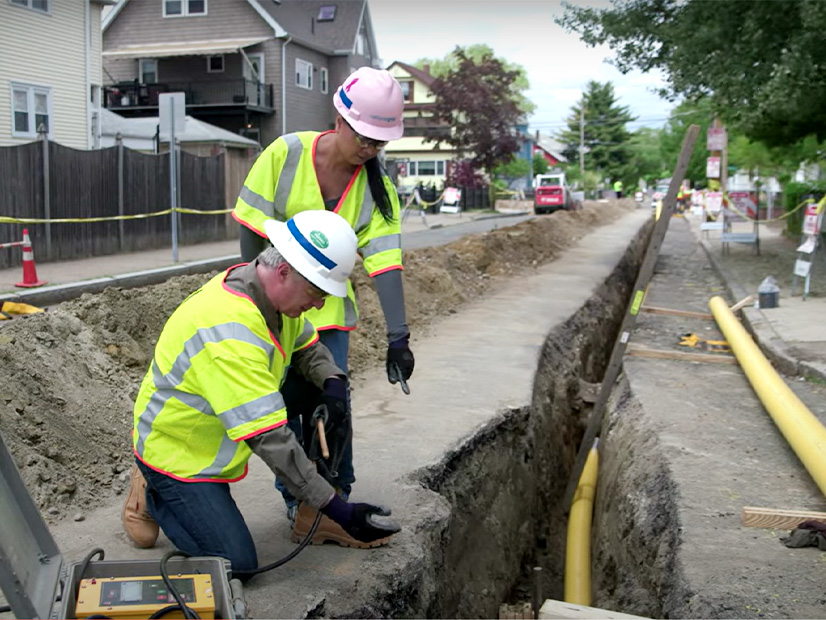The Massachusetts Department of Public Utilities has proposed requiring customers who request new gas service to cover the full cost of any needed line extensions, which effectively would end the gas utilities’ practice of spreading these costs across their rate base.
The proposal is the latest step in the department’s docket focused on aligning gas regulations with the state’s statutory decarbonization requirements (DPU 20-80).
Under the current rules, the utilities are not allowed to subsidize new gas connections through the existing rate base. However, a utility may charge the connection costs to the rate base if it expects to recover the costs from the additional revenues received from the new customer.
In late 2023, the DPU issued a major order setting the regulatory framework for the state’s transition away from natural gas, which announced the department’s plans to reform the “standards for investments to serve new customers.” (See Massachusetts Moves to Limit New Gas Infrastructure.)
The DPU directed the local distribution companies (LDCs) to review their tariffs, policies and practices regarding line extensions, specifically inquiring about “de facto free extension allowances” and “whether existing state policies are inconsistent with current practices by incentivizing new customers to join the gas distribution system.”
The utilities filed testimony in 2024 detailing their line extension procedures, providing some insight into their extension policies and the scope of the demand for new gas service.
Data from Eversource and National Grid’s testimonies indicate the companies continue to add thousands of gas hookups each year, although the annual number of new connections generally has decreased over the past 10 years.
The gas companies testified their expansion policies are consistent with state climate policy, while climate advocacy groups — along with the state Attorney General’s Office and Department of Energy Resources — argued the policies undermine state programs to reduce gas use.
In testimony submitted to the DPU, a representative of National Grid said the “addition of new customers must be viewed in conjunction with the elimination of leak prone pipe and other gas infrastructure work which may reduce GHG emissions to determine if the company is meeting its emission reduction targets.”
They added that the “the implications of connections policy for GHG targets must also consider interactions and dependencies across sectors and fuels.”
Pushing back on the utilities’ claims, the research firm Groundwork Data, with funding from the Conservation Law Foundation, Environmental Defense Fund and Sierra Club, made the case that utilities’ extension procedures “are inconsistent across LDCs, increasingly inconsistent with the principle that existing customers should not subsidize new customers, and inconsistent with state climate policy.”
“Since 2018, approximately 80% of new service-only connections have been provided at no cost,” Groundwork Data wrote. “The average cost of adding new customers was $9,000 in 2023, totaling over $160 million across the Massachusetts LDCs.”
‘Pretty Big Deal’
The DPU appeared to side with the environmental groups and government agencies in its draft policy, which directs the utilities to “require a customer seeking an extension for new gas service to pay for the entire cost of connecting to the distribution system,” unless the customer can qualify for an exception.
To qualify for an exception, the utility would need to show the extension would drive a “demonstrable reduction” in emissions, be consistent with the state’s climate limits, and that the customer has “no feasible alternatives” to natural gas.
Keeping with the current rules, the utilities also would have to ensure the cost of adding the connection does not exceed the added revenues they expect to receive from the new customer, “so that existing customers do not subsidize the cost of the extension of service,” the DPU wrote.
Ben Butterworth, of the Acadia Center, called the draft policy “a pretty big deal,” adding that it likely will result in “a significant reduction in terms of the growth of the system.”
“Obviously those three variables are open to interpretation by the commission, but my interpretation is the vast majority of projects would have an extremely hard time meeting those criteria,” Butterworth said.
National Grid and Eversource declined to comment on the draft policy. The DPU set a March 13 deadline for comments.




